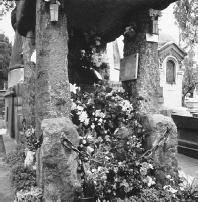Spiritualism
Allen kardec (1804–1869)
Allen Kardec, known as the father of Spiritism, distinct from Spiritualism, was born in Lyons, France, in 1804, with the birth name Hypolyte Leon Denizard Rivail. The names "Allen" and "Kardec" were names from prior lifetimes that he chose to use in his present life experience. The son of an attorney, Kardec decided to become a medical doctor, but he soon became intrigued by the enthusiasm for experiments in mesmerism and spirit communication that were spreading throughout Europe.
In 1850, he began sitting with Celina Bequet, a professional somnambulist (hypnotist) who, for family reasons, assumed the name of Celina Japhet. Japhet not only placed others in trance states, but was assisted in achieving a somnambulistic state by M. Roustan. While in trance, Japhet was under the spirit control of her grandfather, M. Hahnemann,

The 1857 revised edition of Kardec's book, based on the trance communications of Celina Japhet, became the guidebook for those wishing information regarding mediumship, life in spirit, and the evolution of the soul. The Spirits' Book went into more than 25 editions and became popular throughout Europe and South America. However, because traditional Spiritualists reject the concept of reincarnation, conflict developed between the established dogma and the writings of Kardec. Kardec remained firm in his belief in what the spirits had told him: Reincarnation was necessary for the soul to progress and to better understand and heal current physical or mental illnesses, which had been caused by the deeds and misdeeds of prior life experiences. Because of his resolve in these matters, "Spiritism" or "Kardecism" became distinguished from Spiritualism.
Other books written by Allen Kardec include The Gospel as Explained by Spirits (1864); Heaven and Hell (1865); and Experimental Spiritism and Spiritualist Philosophy (1867). Although Spiritism was gradually reabsorbed back into Spiritualism in Europe, it remains popular as a separate philosophy throughout South America, especially in Brazil, where its members see no conflict in being nominal Roman Catholics and practicing espiritas.

Comment about this article, ask questions, or add new information about this topic: